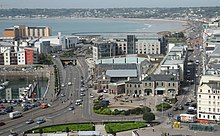Economy of jersey

St. Helier in 2011
|
|
| Currency | pound |
|---|---|
| 1 January - 31 December | |
| Statistics | |
| GDP | $5.1 billion (2005) |
|
GDP per capita
|
$57,000 (2005) |
| RPI 5.0% (2011) | |
|
Labour force
|
53,790 (December 2011) |
|
Labour force by occupation
|
financial & legal (24%), wholesale & retail (16%), public sector (13%) (2011) |
| Unemployment | 4.7% (March 2011 est.) |
|
Average gross salary
|
£2,816 / $4,363 mean monthly (2011) |
|
Main industries
|
Financial & legal services, construction, retail & wholesale, manufacturing, agriculture, transport & communications. (2008). |
| External | |
|
Export goods
|
light industrial and electrical goods, dairy cattle, foodstuffs, textiles |
|
Main export partners
|
|
|
Import goods
|
machinery and transport equipment, manufactured goods, foodstuffs, mineral fuels, chemicals |
|
Main import partners
|
|
|
Gross external debt
|
$NA |
| Public finances | |
| Revenues | $846 million (2011 est.) |
| Expenses | $928 million (2011 est.) |
| Economic aid | None. |
The economy of Jersey is largely driven by international financial services and legal services, which accounted for 40.5% of total GVA in 2010. Other sectors include construction, retail, agriculture, tourism and telecommunications.
In 2008 Jersey’s gross national income per capita was among the highest in the world.
In 2011 the island's economy, as measured by GVA, declined by 1% to £3.6 billion.
Jersey based financial organisations provide services to customers worldwide. In June 2008 it was reported that 12,070 people were employed full-time, within this sector. The Royal Bank of Canada (RBC) is a major employer with some 900 staff employed in Jersey, as of March 2009.
The finance sector profits rose to about £1.5 billion in 2007, representing a real-term increase of 12% on 2006.
Jersey is one of the top worldwide Offshore financial centers It is described by some as a tax haven. It attracts deposits from customers outside of the island, seeking the advantages such places offer, like reduced tax burdens. Its taxation laws have been widely criticised by various people and groups, however the former Chief Minister of Jersey, Terry Le Sueur, has countered these criticisms, saying that "Jersey [is] among cooperative finance centres". And in September 2013 the UK Prime Minister, David Cameron, said it was not fair any longer to refer to any of the overseas territories or Crown dependencies as tax havens, as they have taken action to make sure that they have fair and open tax systems.House of Commons Hansard 9 Sept 2013 Its information privacy law also provides exemptions that other European countries do not, for example in the way Trusts do not have to disclose as much information to Benficiaries about use of their personal data as is normally required under such laws.
...
Wikipedia
